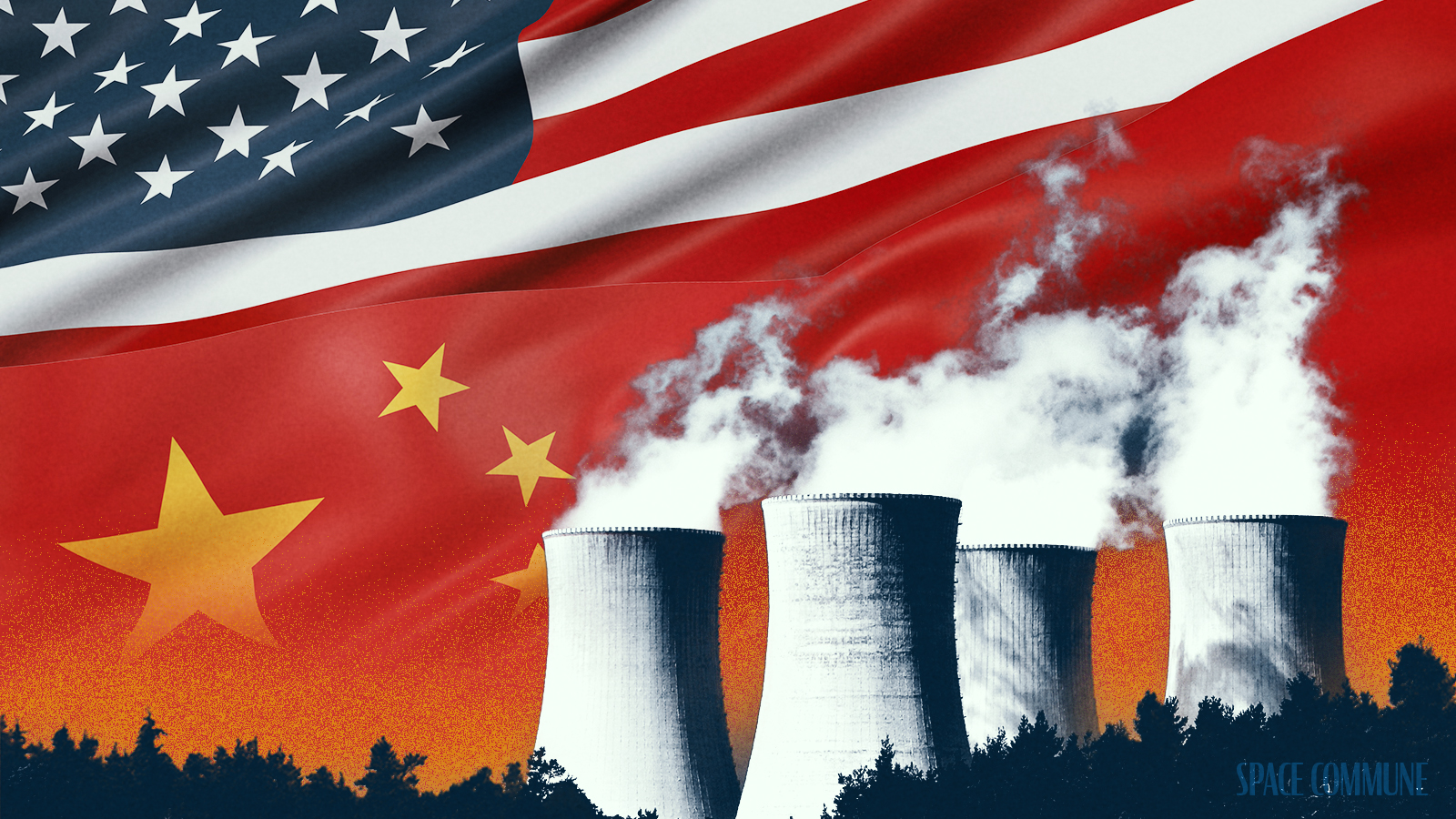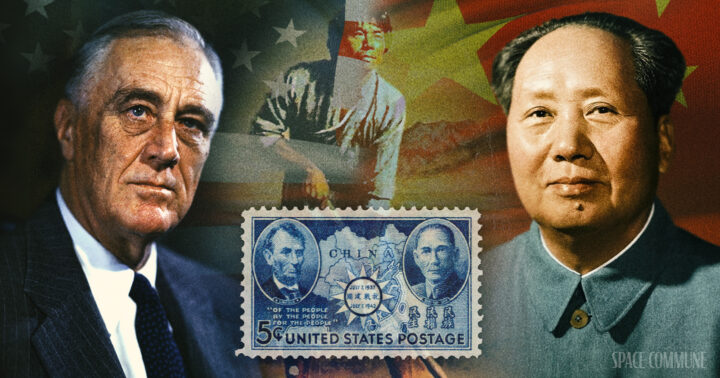In March of 1979, a suspicious series of events unfolded at Three Mile Island nuclear plant that helped retard the next several decades of American energy and industrial policy. It spawned an entire cottage industry of anti-nuclear, anti-industrial and ultimately, anti-human environmentalism activists, non-profits, media and politicians.
Since the incident, only two new nuclear reactor projects have been started and completed on United States soil. In the world at large, the accident’s legacy looms large over the West; of the 57 nuclear power plants under construction, only eight are using Western-aligned financing and technology.
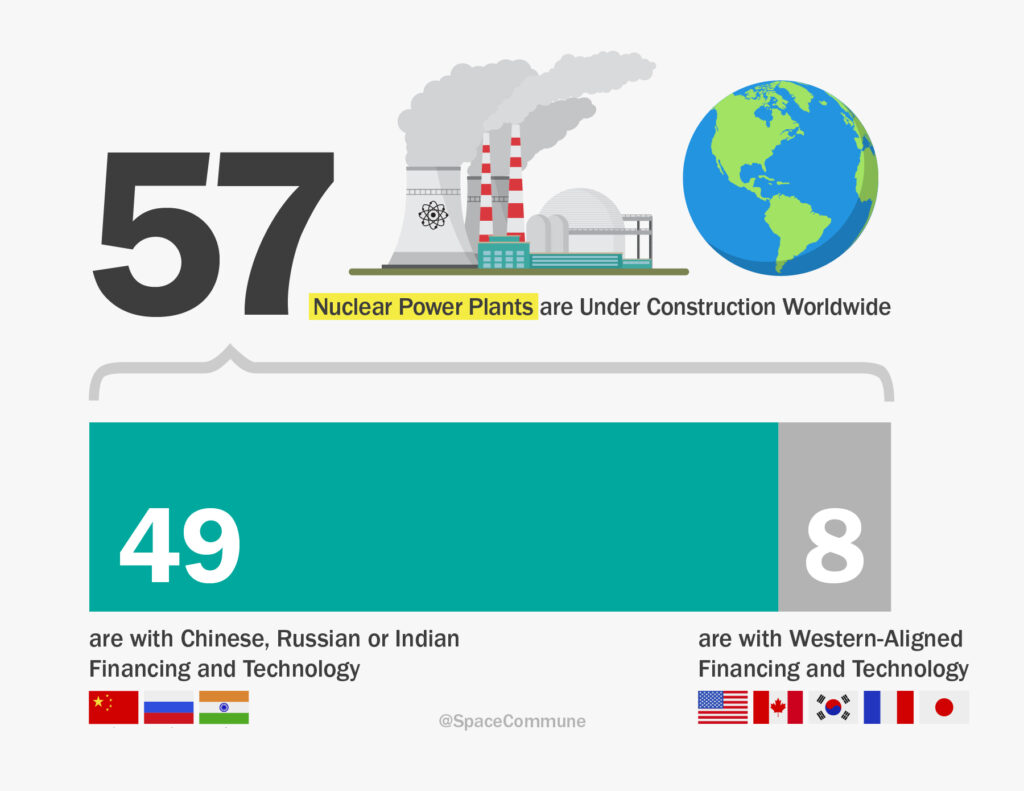
But 45 years later, the anti-nuclear movement has been put out to pasture, and the echoes of Three Mile Island now ring on deaf ears. The same old talking points are suddenly not working anymore, and anti-nuclear activists must be puzzled as to why.
Two major stories came out last week that illustrate what happened:
- A viral Huffington Post story by Alexander C. Kaufman, seen by over three million users on X, declared: Congress Just Passed The Biggest Clean-Energy Bill Since Biden’s Climate Law. It’s all on nuclear.”
- A story by Reuters journalist Timothy Gardner said: US as many as 15 years behind China on nuclear power
The first story describes how the U.S. Congress voted almost unanimously to “[slash] the fees the Nuclear Regulatory Commission charges developers, speeds up the process for licensing new reactors and hiring key staff, and directs the agency to work with foreign regulators to open doors for U.S. exports.”
The second story, which came out the day of the Congressional vote, seems to be the justification for this move. It details a new report put out by the Informational Technology & Innovation Foundation’s Hamilton Center on Industrial Strategy, which explains that China’s deployment of ever-more modern nuclear power plants… will help them gain an advantage at incremental innovation.”
Basically, the U.S. and West are suddenly all-in on nuclear, after years of decline, because China has proven its ability to build and do things. That ability is very dangerous for the existing hegemony, which was once staked on its ability to control the rest of the world’s development.
Is it a good thing that the U.S. suddenly wants to go nuclear? While nuclear fission, and eventually fusion, has the capability to raise the living standards and potentiality of billions of people around the globe, it seems that this turnaround is happening for a very nefarious reason:
The anti-nuclear movement is being pushed aside for the anti-China movement.
The Anti-Nuclear Movement’s Origins
A decade before Three Mile Island, a heavily controlled and well-funded New Age hippie movement waged cultural warfare against modern society, priming people’s worst Dr. Strangelove-esque fears about invisible radiation penetrating their bodies forever. A hysteria-inducing anti-nuclear movie, The China Syndrome (the title’s focus on China is a funny coincidence), was released to great fanfare.
Weeks later, a minor safety incident (likely caused by internal sabotage) at Three Mile Island nuclear plant in Pennsylvania led to an international media frenzy: was a China Syndrome meltdown happening before our very eyes? The answer, confirmed decades later by extensive research, was a definitive no.
While Western nuclear power development was already slowing in the 1970s due to rising interest rates and a slow shift to deindustrialization, the scary coverage helped turn public opinion about nuclear energy: the dream of abundant and cheap nuclear power was suddenly too dangerous to consider. Jimmy Carter famously said, if Americans were cold, they should wear a sweater instead of using energy to heat their homes.
Meanwhile, instead of using uranium and nuclear fission to power Western factories, free trade policies were used to incentivize China to burn coal to produce needed consumer goods.
It Paid to be Anti-Nuclear
The cadre of star anti-nuclear activists, media personalities and politicians that gained prominence from Three Mile Island spent 40 years fearmongering about the evils of radiation, industry, and reliable energy; advocating instead for the anarchic ebbs and flows of renewable energy.
As I covered in previous articles about TMI, literal hippie cult members made a living off of anti-nuclear fearmongering in the wake of the incident.
“I now have to wonder if somewhere there has to be a meltdown with half a million martyrs to save this planet, because only a disaster on that scale would make people see what nuclear technology is all about.”
-Helen Caldicott
But the best example is the Union of Concerned Scientists, whose 1970s spokesman Robert Pollard was yet another Creative Initiative Foundation (gnostic, Aquarian cult) member. After Pollard quit his job at Indian Point Nuclear Power Plant in an anti-nuclear publicity stunt, the UCS rode the Three Mile Island incident to national, decades-long prominence.
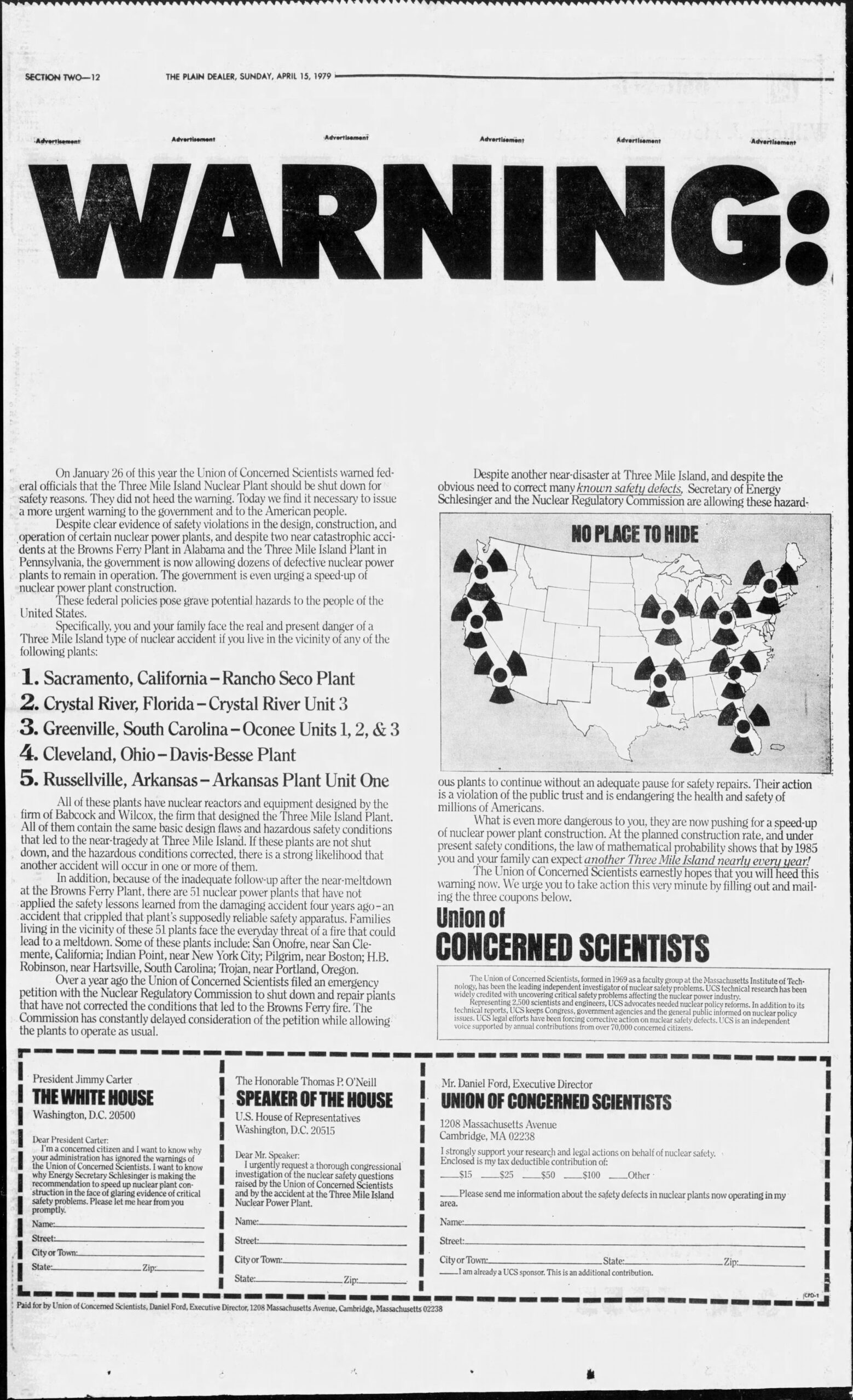
Today, whenever there’s a story about nuclear energy, we can rely on the Union of Concerned Scientists and their current spokesman Ed Lyman to get a negative quote.
When California’s Diablo Canyon nuclear plant was up for extension in 2022:
“Inspectors missed serious corrosion of the auxiliary feedwater system at the Diablo Canyon-2 #nuclear reactor in 2020 that subsequently led to a forced shutdown. One factor the report doesn’t mention is the possible impact of #Covid_19 on the inspections.”
Diablo Canyon received a five year extension in the fall of 2022.
When small modular reactor company NuScale had a temporary setback in late 2023:
“The termination of NuScale’s contract signals the broader challenges of developing nuclear energy in the United States. Placing excessive reliance on untested technologies without adequate consideration of economic viability, practicality, and safety concerns is irresponsible and clearly won’t work.”
Since Lyman’s quote the price of NuScale’s stock has gone up by over 500%.
When 22 countries at COP28 promised to triple nuclear power by 2050:
“It’s an essentially meaningless commitment,” said Edwin Lyman, director of nuclear power safety with the Union of Concerned Scientists. He noted that some of the countries who signed the pledge don’t even generate nuclear power right now, so a tripling would still technically be zero. And it doesn’t include China or Russia, which are global leaders in regard to nuclear ambition… “it’s not really clear that anybody has a particularly credible plan.”
In last week’s story about the Congressional action to streamline nuclear licensing, Lyman and UCS spoke out yet again:
“Make no mistake: This is not about making the reactor licensing process more efficient, but about weakening safety and security oversight across the board, a longstanding industry goal.”
But like a mouse pressing a button to get a treat, the anti-nuclear fearmongering isn’t working anymore. It wasn’t beaten with facts and logic; it’s been swept aside by anti-China, Cold War 2.0 propaganda, which is making politicians ditch the anti-civilizational doomsayers of yesteryear and embrace an economic and military buildup to direct conflict.
The Anti-China Justification for Nuclear Energy
We’ve covered in the past that China has an amazing nuclear program.
Since China has access to coal, lithium and uranium, and is trying to augment its status as a sovereign nation in opposition to the G7’s system of control and decay, it stands to reason that they’re growing their nation with a combination of coal, solar panels, batteries and nuclear energy.
Currently, the average Chinese citizen has access to about half of the electricity of the average American, per capita. But that gap is rapidly closing, and it’s clear that thanks to its Hamiltonian industrial policies, China is on a trajectory to rocket past the United States in its capabilities and quality of life.
“About 70 percent of the cost of Chinese reactors are covered by loans from state-backed banks at rates as low as 1.4 percent, far below rates nuclear power companies can receive in other nations.”
This Hamiltonian influence dates back to Sun Yat Sen, known today in the PRC as the “Forerunner of the Revolution” and the pre-cursor to Mao.
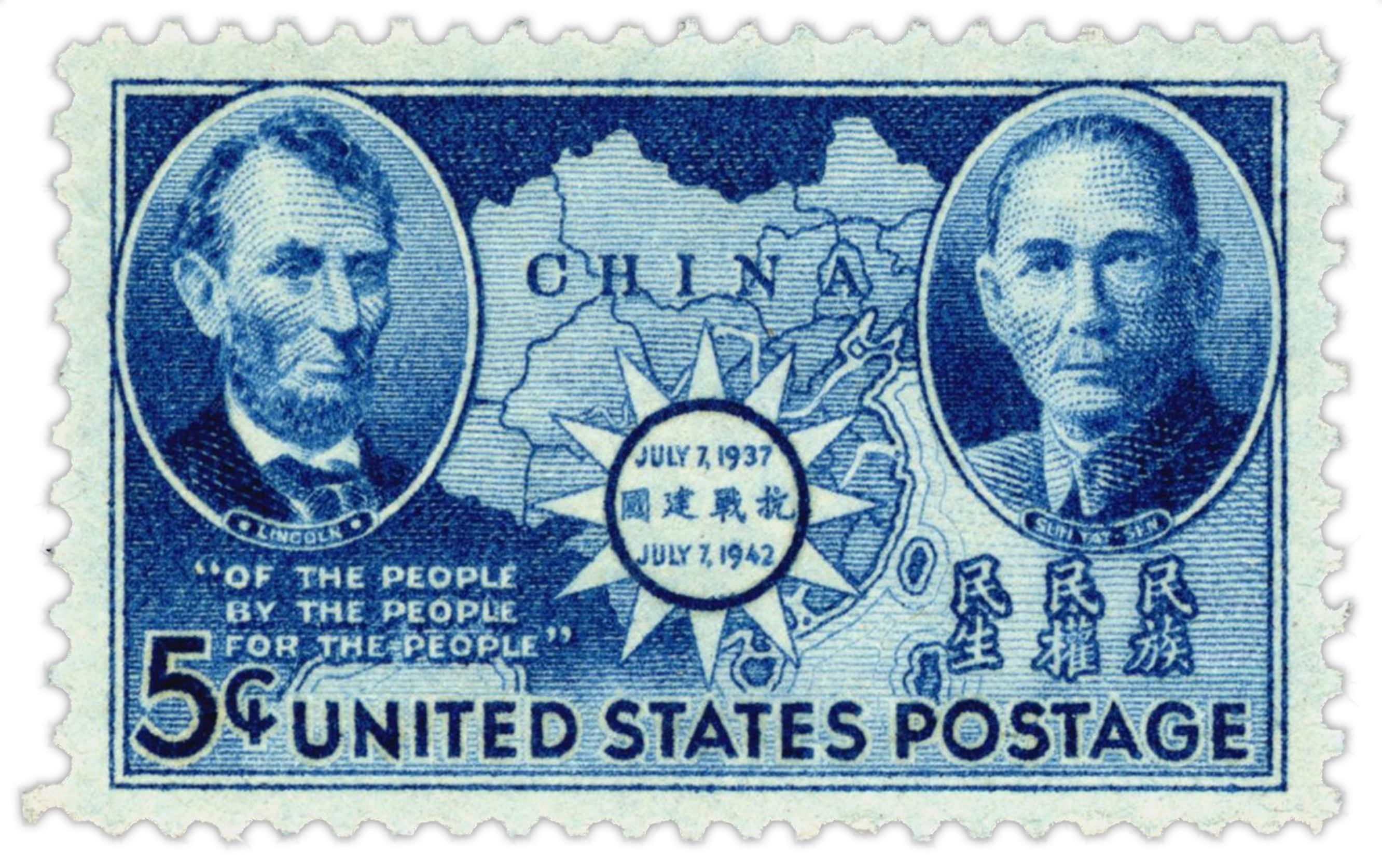
According to Michael Billington, writing for Executive Intelligence Review (1992):
In his highly developed programmatic proposals for the International Development of China written in 1921, Sun reflected the Hamiltonian rejection of Adam Smith’s free trade dogma:
“All matters that can be and are better carried out by private enterprise should be left to private hands, which should be encouraged and fully protected by liberal laws…. All matters that can not be taken up by private concerns and those that possess monopolistic character should be taken up as national undertakings.”
For these major projects, especially, “foreign capital, foreign experts and organizers, and gigantic methods have to be adopted.” He added that the unbridled competition of the Adam Smith school had proven to be
“a very wasteful and ruinous system…. It has been discovered by post Darwinian philosophers that the primary force of human evolution is cooperation, and not struggle as that of the animal world…. If we still retain the custom of free competition or laissez-faire, it will be like encouraging a lame man to contend with an automobile in a race.”
Sun did not merely plead for assistance from the developed nations for the development of China. Like the circles around Hamilton and Benjamin Franklin, who saw that the building of a true republic in the New World was a step toward saving Europe from the impending Dark Age under the destructive oligarchical forces centered in England, so Dr. Sun saw that the western nations were on a suicidal course, and that unless the rapid technological development of the poor nations of the colonial world were taken on as a priority by the West, then further self-destruction was in store.
A New Era Dawns
The reasons for governments, former anti-nuke celebrities and activists suddenly embracing nuclear are becoming clear.
It’s not because the anti-nuclear arguments have been defeated, or that America is returning to its Hamiltonian roots. It’s not because we want to help the world experience peace through development.
It’s because our government wants to play a zero-sum game against China and Russia to control the world, with many recent statements by American politicians exactly spelling that out.
“Let us emphasize: it is in the best interest of the United States and the rest of the world for our country, instead of China and Russia, to be the preferred partner for embarking nuclear nations. In that role, we can influence responsible protocols and regulations that govern nuclear safety, security, and safeguards.”
– Congressmen Byron Donalds (R-FL) and Chuck Fleischmann (R- TN), 2024
As we stand at this crossroads, the U.S. must return to its Hamiltonian roots, which prioritize innovation, development, and cooperation over competition. We can work together to develop advanced nuclear technologies, including the promising field of fusion energy, where China just achieved a world-leading breakthrough. Fusion holds the key to an almost limitless supply of clean energy, and international cooperation will accelerate its development and deployment.
We should accept that we have more to gain by working with China and other nations than in isolation.
